On 14th June 2019, a historical event was organised by Pratiman Singh Lama Salig Nirman Samiti, Kurseong Municipality commemorating 129th Birth Anniversary of Veteran National Freedom Fighter & Writer of First Original Nepali Novel ‘Mahakal Jasoos’ – Shri Pratiman Singh Lama.
The Chief Guest of the auspicious programme, Shri Krishna Singh Moktan (Ex.IGP & Sahitya Akademi honoured Writer) laid the Foundation Stone of Late Pratiman Singh Lama’s Statue at Gorkha Jatiya Bibhuti Uddhan, Bhanu path, Kurseong.
Some great people with extraordinary mind and characteristics have walked the face of the earth since time immemorial. Many of them became divine masters, legends and heroes and their stories have been told and listened incalculable number of times primarily because people did not forget them, neither did their nation nor the era. Even after they are long gone and their mortal remains turned into dust, their names and their deeds are eternally inscribed in the history of mankind.
Alongside those great men, many other heroes sacrificed their lives for the same cause or motive as their superior counterpart engaged in altogether but sadly they were forgotten in the course of time. Perhaps some of them are the ones who made those legends’ tales told. But their inglorious contributions were never mentioned or valued as they might have gone unnoticed, uneventful or unheard. Or for the matter, their magnificent role was conspicuously hidden in the darkness for one or multiple reasons.
The fame of their valiant role might have resonated for a brief period but eventually became unknown as though they never existed. Amongst them some might even have turned out to be just a myth and some, as we, the modern human and intellectual people politely classify as the Unsung Heroes and permanently concealed their identities in the dark dungeons of history.
Being human and possessing humanly instinctive behavior, we often tend to commit such errors but on the other side we also do identify and realize our wrong doings henceforth make effort to rectify them to the best of our abilities. Being forgetful is not a sin but being ungrateful is indeed an immoral act.
The following illustration is also a historical factual of an extremely courageous, diligent and patriotic personality who loved his people and country more than his own existence yet generous and humble.
Historical Fact
We have heard and read umpteenth times that our fathers and grand fathers have immensely contributed to our great nation in various avenues and has set prominent milestones in the history of pre and post independent India. Those valiant sons of our motherland contributed to the society and country as a whole through their specific line of expertise in different arena such as; art & culture, education & literature, medicine, sports, business but most importantly for nation’s independence and national security. Those great souls most painstakingly and courageously sacrificed their lives for the betterment of our society and people. Their remarkable stories of heroism and patriotism have been repeatedly told end number of times over a period of more than two centuries. However, every one of those great men are not remembered and revered today as our society and government forgot their roles in building our modern society and furthermore ignored their exceptional deeds as if they never existed. One of them was Late PRATIMAN SINGH LAMA.
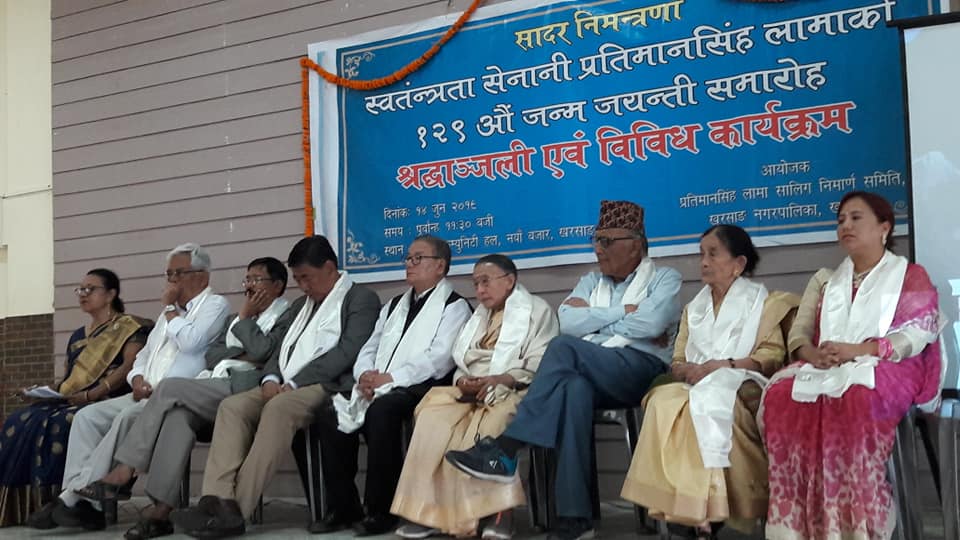
Born in the year 1895 to a moderate family of Late Mangal Singh Lama and Jethi Tamang of Tekbir Busty, Kurseong, Darjeeling, Late Pratiman Singh Lama was exceptionally smart and intelligent person since his boyhood days. He acquired his primary education from the then Middle English School, presently known as Puspa Rani Higher Secondary School, Kurseong and later received secondary education in Darjeeling Government High School where he was given a monthly stipend from the government at the rate of Rs.3 as he always stood first and few times in second position among his fellow classmates.
In 1910, he completed his matriculation which was known as Inter Examination during that period, securing first position. On his glorious success in passing tenth standard, the entire Darjeeling District rejoiced and celebrated and was even carried around the town on a palanquin. He was conferred such an honour by the people because it was indeed a matter of great pride and triumph for the whole region and Gorkha community in particular as there were very few who could achieve educational qualification up to tenth standard. The jovial news also reached the ears of the then District Collector and he immediately called on to the boy’s father Mangal Singh Lama and congratulated him He then offered his best possible help for the boy’s further studies and for opting a government job. Highly obliged father thanked the DC and expressed his desire to make his son a forest ranger as his son could wear a hat, a full-length uniform and ride on a horseback and would not have to get down while passing by a British officer – as in those days any Indian riding a horse would have to get down and greet the passing British officer (as quoted by Shri G.B. Bal in Sunchari nepali newspaper on 05/05/2004).
Subsequently, Shri Pratiman Singh Lama was sent to Dowhill Forest School for few weeks to undergo basic training and later to F.C. College, Jalpaiguri. Then onwards, with the help of government he was sent to study and undergo training at Forest Research and Training Institute, Dehradun. He studied and received the training for two years. There also he accomplished his education and training in first division. During those days such commissioned forest official was given a title of DDR (Dehradun Rangers) hence he was also awarded the same. After his return to Kurseong he was appointed as a Ranger in Dowhill Forest Office.
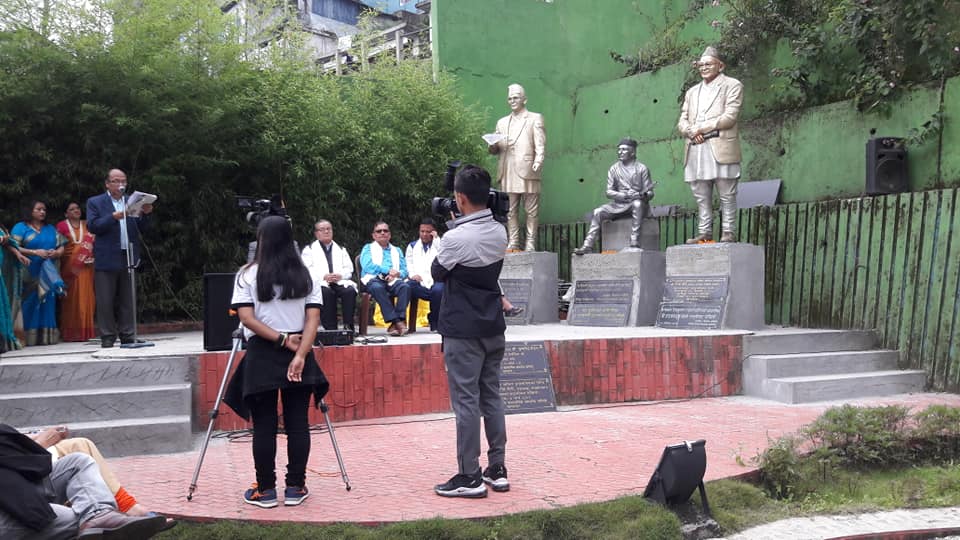
A few years later, he married Phulmaya Tamang, daughter of Pakhrin Sardar of Longview Tea Estate. His father-in-law was highly respectable personality who was a contractor of Saat Ghumti Tea Estate during those days. As years passed by, they had five children (2 daughters and 3 sons) out of them the eldest son died at an early age. They were namely, Tekendra Kumar Lama (died at an early age), Manorama Lama, Narendra Kumar Lama, Mahendra Kumar Lama and the youngest daughter Tilotama Lama.
In the meanwhile, he was temporarily posted at various forest offices of the region – Kalijhora, Teesta, Tarkhola and eventually in 1918 he was given a promotion and became a Divisional-Forest-Officer (DFO) and was transferred to Baikunthapur Forest Office. This office used to be located near present day 2nd Mile, Siliguri.
Political Life
Despite his highly respectable government service and ample future securities he was somehow more concerned and inclined towards the national issues, social condition of his fellow-citizens. Deep within his conscience he wanted to seriously work for the betterment of the society. In short, he did not want to work under the British Government because of its corrupt and malicious policies and rules. He could analyze and understand vividly the cruelty and suppression against Indians. Thus, he affirmatively decided to dedicate his time and knowledge for the greater cause of the country, its social reforms and fight against British Raj’s dominance as in those days the British authorities deprived our peoples’ civil and fundamental rights and were discriminated in varied ways. Racism and oppression against native Indians were the most common tribulations.
Late Pratiman Singh Lama was not just an ordinary man employed as a forest officer but he was also a versatile writer of that era. He was a brilliant writer, a poet, a columnist, and an editor. He possessed incredible sense of humor and replicated this quality in his writings. One of his greatest masterpieces was novel titled, ‘Mahakaal Jasoos’ a political satire based on Indian Gorkhas. It is said that; His Majesty’s Royal Nepalese Government demanded and received tax as ‘Royalty’ from the British Government imposed on bona fide Indian Gorkhas while joining Indian Army and in that book Pratiman Singh Lama had strongly condemned and criticized the practice/law. Through this book he disgraced both the governments of such mal-practice and dared to reveal their dishonorable practice in front of the society. The novel immediately drew attention of British and Nepalese Government and consequently within a day all the books were seized from bookstands and other sources and were practically burnt and destroyed by the officials of both the Governments. Afterwards, some said one survived piece of the aforementioned book was seen in one of the libraries in Kathmandu, Nepal but there is no evident proof. Many scholars/intellectuals including Pratiman Singh Lama’s younger son, Late Mahendra Kumar Lama anxiously searched for its existence in India as well as in Nepal but sadly no one have ever succeeded in finding one.
Some of his highly celebrated books are:
1. Mahakaal Jasoos:
This famous controversial book was printed at Hari Printing Press, Kurseong in 1919. This book is regarded as the first Nepali Novel written outside Nepal by many researchers and Nepali writers.
2. Should Hillman join Politics:
The articles of this book were published in ‘Young India’ a very famous news paper of that period which was established by Gandhiji.
3. Khukuri Vs Kripan
This book was written on the basis of ban enforced by the government on carrying ‘Khukuri’ (a traditional dagger) to the then nepali residents of Assam and created problems as carrying one at all times was like an integral part of daily life and symbolic to male Gorkha/Nepali. This article was also published in ‘Young India’ and ‘Amrita Bazar Patrika’ and thereafter compelled the government to lift the ban.
4. Paak Parimal
A remarkable Nepali book on culinary art and its variety, recipes and some special cuisine prepared during special occasions, festivals and religious ceremonies.
During his life time he wrote many articles, books, short-stories and poems. He was also a correspondent for Amrita Bazaar Yugantar News paper and by understanding all these facts it would not be inappropriate that through his publications he, thereby immensely contributed valuable treasures in the field of literature too. He was also an executive member (Editorial Section) of Gorkha Public Library of Kurseong. This library has its own brilliant significance and is a symbol of Gorkha heritage in the country. He was also elected twice as the Chairman of Kurseong Municipality.
Late Pratiman Singh Lama was a very simple and ordinary looking man who mostly wore plain white khadi clothes. He was kind hearted and docile natured. He loved his countrymen and would often go to interior areas of tea gardens located in the surrounding hills and valleys to meet them. He was also fond of his family and loved his children but he was disciplined and well-mannered. He would often tell other people and his folks to stay away from alcohol and social vices like drinking, domestic violence, gambling.
While still serving in the Forest Department, he constantly remained unhappy and hated the vile system of the British government and the way the Indians were treated with humiliation and were subjected to disgraceful punishments if anyone dared to raise a voice against the atrocities. Simultaneously, he seriously thought that it would be ethically wrong to rise against the British government and yet work under the same. Hence, he decided to resign from the post of Divisional-Forest-Officer (DFO) eventually and leaped towards the National Freedom Movement of India.
India’s Freedom Movement
Because of his extreme affection and respect towards the society and its people and nation as a whole, he began to work extensively for the sole purpose of National Movement for Freedom, its importance and urgency. He most dedicatedly emphasized to bring the sense of awareness in people and necessity to unite to fight against the foreign dominance. He went on meeting townsfolk and visited rural tea garden areas for the same. Later, during his days of prohibition to meet local people and hold meetings, he used to quietly sneak behind the police disguised as a blind old man and went on meeting people from rural tea gardens. He was often addressed as ‘Andha Bajey’ – blind old man by those village children and followed him around. Somewhere around late 1980’s one of those children had grown old narrated this story himself to the family members of Late Mahendra Kumar Lama.
In the year 1919, he joined Gandhiji’s National Movement ‘Satyagraha’. He became the President of National Congress Committee, Darjeeling, (District Level) after Late Dal Bahadur Giri. Then onwards he became a serious threat to the government and as a result he was enlisted as an unlawful citizen in police and administration records. He was frequently detained and interrogated by the police and numerous times his house was searched and countless papers and documents were seized. After his father’s demise, he moved to Tekbir Busty where he built a house and named it ‘Polyview’ which still exists. He became even more determined and insistent on doing work for India’s Freedom Movement after meeting Gandhiji in 1925 when the great leader – father of Nation had come to Darjeeling to meet legendary politician of West Bengal Late Deshbandhu Chittaranjan Das who had fallen ill and was recuperating in the hills. During Gandhiji’s visit congress delegates came to meet him from all four sub-divisions of Darjeeling. Pratiman Singh Lama also met Gandhiji heading the Congress delegation from Kurseong.
At Kurseong, his close associates were Late Sita Ram Agrawal, Late Keshar Bahadur Gurung, Late Trichandra Gupta, Late Suraj (Sarju) Prasad Poddar, Late Savitri Devi (Helen Lepcha) and many others. Those great souls also have unique and huge contribution towards National Freedom Movement.
Late P.S. Lama relentlessly wanted to bring social and political awareness in the society and travelled extensively to educate people and make them understand the Gandhian philosophies and principles on national movement for freedom of our country. He even ran a secret printing press where he could print important papers, journals and books. Those days, he was financially very strong as he owned over three hundred fifty-five acres of land near present day Champasari which was known as Madlaguri Joth during that time and another equal measure of agricultural land in Naxalbari region namely, Bhelku Joth and Lohar Singh Joth which produced huge amount of rice, mustard and other cash crops were cultivated by his tenants/caretakers. The income generated from these fields was considerably high.
Apart from these agricultural territories, he owned several landed properties in Tekbir Busty, Merry View Tea Estate, Sukna Army Cantonment area and even a piece of land in the heart Siliguri town (present location Kurseong Medical, Hill Cart Road). His source of income was reasonably sufficient for him and his family’s survival but altogether he could also spend huge sums of money for the political cause which indeed was circumstantial necessity and were recurrent too. During those days he also travelled far and wide to various parts of the country like Banaras, Allahabad, Kanpur, Calcutta, Bombay, Lahore, Delhi to meet eminent political personalities and attend various national level political conferences and meetings. He spent his valuable time and resources for the good cause of the society in all possible support, for the higher objective of the country – India’s Freedom from British Rule.
It is said that during the famous ‘Great Trial’, Gandhiji was sentenced to six years imprisonment and consequently the entire country became agitated and rose against the court’s verdict. The fire of resentment spread throughout the country and also caught Darjeeling Hills in its flare. Under the chairmanship of Pratiman Singh Lama, several protest gatherings/meetings took place. The people of Darjeeling took to the streets in revolt and protested against the injustice done to Gandhiji. During one of such secret meetings, the police was secretly informed and while the meeting was taking place the police raided the gathering where he was severely beaten up with batons and even one of the policemen merciless fractured his nose with a heavy torch-light. Thereafter, he was kept under house-arrest and was not allowed to meet anyone or for that matter he was not permitted to go anywhere. The police officials raided the entire house and confiscated all the documents and journals.
In 1942, during Quit India Movement, he was completely involved and thoroughly participated at several protests and public demonstrations as a result he was arrested and brutally tortured. Following the incident his health condition started deteriorating. After his wife’s death his condition worsened further as there were only children at home who could not take proper medical care and give necessary attention. As a freedom fighter he not only sacrificed his family, a government service, his youth but he had also contributed and donated huge sums of money and wealth. He generously utilized so much of cash and valuables for the cause of national freedom that he literally became penniless and spent his last days in sheer misery and poverty and finally his mortal body could no longer endure the pain and agony of his ailment. Ultimately on the darkest day of Gorkha history Shri PRATIMAN SINGH LAMA died at his residence, Polyview, Kurseong, Darjeeling on 4th May 1944 at the age of forty nine. It also said that he was conferred with an honor of National Freedom Fighter and his body was draped in Indian National Flag at the time of cremation. As a result, our Gorkha/Nepali community, our country lost a great freedom fighter forever.
But it is extremely sad and unfortunate to state that such an astonishing person who was a social-worker, a political leader, All India Congress Committee President- Darjeeling (pre independence), a learned master, a writer, an author, a poet and principally a loyal citizen of India did not get any form of recognition after independence in 1947. Perhaps, our country’s famed politicians; leaders of Indian National Congress did not consider his contributions as equal as theirs. But on the contrary, on 15th August, 1947 Kalimpong Drivers’ Association constructed and inaugurated a brass plated Memorial pedestal whereon his name is engraved and it still exists at Kalimpong Motor Stand. Born on the soil of Kurseong and a pride of entire Darjeeling Hills, Late Pratiman Singh Lama was remembered occasionally by some reputed writers and consequently his articles were published in local English, Hindi, Bengali and Nepali Newspapers but till date no association, organization, politicians or state government has taken any initiative to recognize his sacrifices and contributions on a national level.
An Appeal to the Government
Even after a person of his stature dies, his name should not be forgotten – his enormous contributions towards mankind, society and his country should be valued and respected by our people, our community and our country. I believe it is our moral responsibility and humanly duty to remember, honor and express our sense of gratification towards such an incredible person who lived for his countrymen and died for his country.
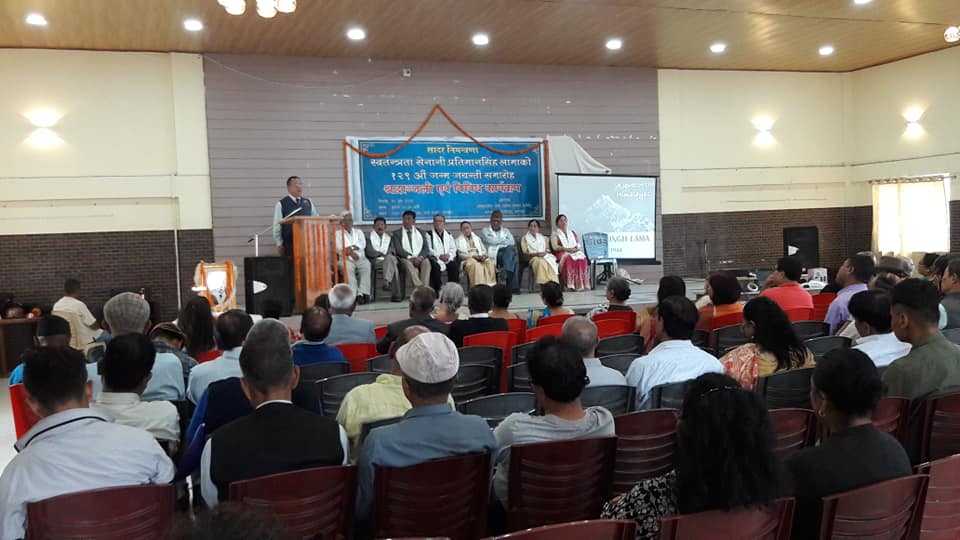
With much respect and humility I have attempted to illustrate notable facts in regard to his noteworthy both personal and political life episodes herein which may not be justifiable to have transformed into a few unworthy words yet I strongly trust in your authority and sense of nationalism that after your thorough reading and analysis you would positively grant justice and recognition to his supreme contribution to the society and nation at large.
National Freedom Fighter Status
Late Pratiman Singh Lama most sincerely and dedicatedly involved and worked for the cause of the freedom movement of our country at various levels and capacities and helped and motivated other freedom fighters of Kurseong, Darjeeling and Kalimpong to spread the sense of awareness and importance among common people. He vigorously worked towards reaching and making people understand the principles of Gandhi and unite in the movement in support of the nation wide demand for country’s freedom from Colonial supremacy and atrocities. He traveled far and wide like Delhi, Lahore, Bombay, Calcutta, Banaras, Allahabad, Kanpur to meet distinguished political personalities and attend various regional and national level political conferences and meetings and also to discuss and prepare strategies of the movement in the hills and other areas. He spent his valuable time and resources for the good cause of the society in all possible support, for the higher objective of the country – India’s Freedom from British Rule.
During the movement he personally met Gandhiji in 1925 during his historical visit to Darjeeling to meet legendary Shri Deshbandhu Chittaranjan Das. Shri Lama had led the National Congress delegates from Kurseong to meet Gandhiji. Late P.S. Lama often visited the distant areas of surrounding tea gardens of Kurseong and Darjeeling to meet the common people and make them understand the reason and urgency of the freedom. He did so to widespread the message and motive of Gandhiji. He persistently worked towards bringing awareness to the furthest areas even to the extent of disguising himself as a blind man, a ragged homeless man during the prohibition imposed on him to meet the local people and was subjected to house arrest.
Despite of all odds and warnings from the administrative authorities and police, Shri Lama did not keep quiet and stay away from doing activities for the freedom movement rather he went on meeting people and addressed them during meetings at public places. He even organized secret indoor meetings with his colleagues. During one such public meeting police personals abruptly attacked the gathering and physically assaulted Shri P.S. Lama and severely injured him. He was then arrested and was charged as committing cognizable offence. Due these brutal assault and internal injuries and also non-availability of medical treatment he succumbed to his serious internal wounds and died at early age.
It is my most humble request to the government that Pratiman Singh Lama’s extreme affection and respect for the nation and simultaneously involving in the Freedom Movement of India and serving the nation for its great cause till his last breath, he undoubtedly deserves an honour and respect from the Government and as mark of tribute and gratification he should be awarded a National Freedom Fighter Status.
Conferment of Tamra Patra
In reference to the facts about Tamra Patra Award, to the best of my knowledge this prestigious certificate/award is given to individuals for their participation in the Indian Freedom Struggle. But sadly why do most Indians know very little about the Northeastern states? Why is there very little information about these states and their role in Indian history and the freedom struggle? as quoted by Subhayan Purkayastha. A twelve (12) year old girl Aaira Goswami, originally from Assam and currently residing in Jaipur has written a letter to The Prime Minister, Shri Narendra Modi saying “I know the history of almost whole of India; Jammu & Kashmir to Tamil Nadu, from Mughals to British, from Rajasthan to Kolkata. But where is the long lost glory of the Seven Sisters. Some students don’t even know what the Seven Sisters are. It is very difficult to find things about the Northeast in my books. If I could just read about my state, Assam, and Northeast in my book it would be like a dream come true.”
In a similar context, very few people more specifically speaking, the historians know or have written about the region within the Indian Territory – Darjeeling, Kurseong & Kalimpong to name in particular and its people who fought courageously for the freedom movement of India and sacrificed their lives for this country. Amongst those brave freedom fighters, Late Pratiman Singh Lama too participated and valiantly protested against the British Government through his writings in books & journals, illustrating in various newspapers of that period, resigning from his government service from the post of senior forest official, meeting and attending several national level conferences and meetings with illustrious politicians and leaders of the National Congress, organized political meetings and headed protest rallies against the policies and rules of the British authorities, elected and served twice as the Municipal Commissioner of Kurseong Municipality for a period between 28.04.1941 to 04.05.1944.
He was put under house-arrest in Kurseong and his books, journals, notes, important documents were seized by the British police and authorities. According to an illustration he was arrested and trialed. He sacrificed everything for the cause of the freedom struggle including his family and landed property. Even his house was captured by others (non-family members) making false and fake land papers. His minor children literally came to the streets after his death. His two sons, Narendra Kumar Lama and Mahendra Kumar Lama were practically thrown out of the school (Middle English School-present day Pushpa Rani High School, Kurseong) and their names were erased from the school register on the instruction of British authorities as because they were children of a Freedom Fighter – children of Pratiman Singh Lama. His daughters were married at an early age because there was no one to look after them and protect them. Shri Lama contributed for the good cause of the nation so much but till this very date the government has never valued his immeasurable contributions and showed gratitude in any manner.
Hence, I request the concerned authorities of the Government of India to at least pay respect and acknowledge his immense contribution in building our nation by awarding him with country’s prestigious award – ‘TAMRA PATRA’.
- I most humbly wish to make an appeal to your gracious self that considering his immeasurable contribution to this great nation, our state of West Bengal and Darjeeling as well as Kalimpong districts in particular should commemorate a day in a year to pay tribute to this great soul – Late Pratiman Singh Lama. The day must be observed in harmony by all and should also make our nation realize that such great Gorkha citizen once lived and died for the freedom of India.
- I would also like to courteously urge the government and administration that in the process to pay tribute and continually remember Late Pratiman Singh Lama, a ‘Memorial’ of his statue must be erected at a suitable/precise location as a mark of honor and reverence. This benevolent act will certainly convey a tremendous sense of admiration and pride amongst our people and glorify our history of nationalism and our peoples’ contributions and sacrifices for the great cause of our country and its grandeur. The statue would be a hallmark of our people, of our existence, of our history and most importantly of our role in the making of this country – a free country, an independent country.
- Similarly I would also wish to put forward my humble submission that along with above stated prayer it would be even higher gesture if a landmark/ government premise/ road or any other important venue could be named after him. As a token of remembrance and gratification on behalf of our entire region, community, society and the government we could at least pay our homage in this manner and set an example for the forth-coming generation that we have not yet forgotten our legends’ gallantry sacrifices and will not be ignorant to value their blood and tears spilt for our today and our children’s better tomorrow.
- In addition to the same matter, I would also like to request you to kindly include a proposal to the relevant ministry of West Bengal to incorporate a text book or least an elaborate chapter of Late Pratiman Singh Lama either at secondary or senior secondary school syllabus. In my personal opinion it would undoubtedly boost up and motivate our children to set their goals with much determined and stronger aptitude. I ardently believe that such excellent historical facts about our own people will further strengthen their attitude towards society and help in their personality development which is absolutely necessary quality in our children. Since ancient times, people have been studying history as an essential subject as because history helps to build our future in a more superior and brilliant manner apparently the reason being we get to study about great people and their even greater deeds. Hence, I may kindly be allowed to make a strong suggestion on this matter. Since premature standards of our schooling we have read about numerous heroes and their glorious achievements and as a result we get highly inspired and desire for doing somewhat similar praiseworthy work because they teach and make us aware of our capabilities and also should learn to utilize our wisdom not just for our personal enhancement but we should comprehend on our social and national issues and interests. Therefore, when we emphasize and study on world history then why also we study about our own people, our roots simultaneously.
- It is my honor and privilege to humbly request you to kindly make a strong and effective proposition to the concerned ministry to introduce/initiate a Postal Stamp of Late Pratiman Singh Lama which will indeed be a greatest honor and respect to acknowledge his immense contribution towards the freedom movement of our county. It would certainly be a milestone in the history of India and make the citizens proud that such lion-hearted legend once born in India and sacrificed his life for the sanctity and honor of his motherland to which he loved and respected beyond ordinary degree. Your voice and support towards this noble cause would incredibly boost our optimism and eternally remain grateful to you.
Before I conclude this article, I would like to highlight the following matter which is of absolute mystery and injustice and ask for your serious intervention and initiative to a satisfactory conclusion. I have mentioned above that Late Pratiman Singh Lama possessed considerably a large volume of landed properties chiefly his private residence, Polyview at Tekbir Busty, Kurseong, agricultural lands around Mallaguri and Champasari, Loha Singh Joth & Bhelku Joth near Naxalbari. It is also stated that after his demise his four surviving children who were barely teenagers and did not have adequate knowledge about assets and rightful inheritance. In fact, after their father’s untimely death they literally became orphans and were neglected by relatives and other known people in every possible manner. They were practically plundered and became homeless and were denied reasonable help due to fear of British authorities since their father was red marked as an activist, a freedom fighter and tagged as anti-national. Their situation turned out so pathetic that even a decent meal of a day became a futile dream and their reality turned into a horrific nightmare. It is said that whosoever gave shelter to a family of a person who dared to struggle for freedom would be seriously dealt by the law even to the extent of physical torture and imprisonment. Alas, they ran helter-skelter and were ultimately disintegrated from each other for over twenty years. The youngest daughter never ever met any of her siblings. Only once she could meet one of her brothers during his last days.
Now the mystery is, who took all the assets and how? Was it his family, his colleagues? Or for that matter the government itself? And how did this all happen?
On this matter I would like to amplify a fraction of truth.
Late Mahendra Kumar Lama, younger son of Late Pratiman Singh Lama years later came back to Kurseong and attempted to find out his father’s lost possessions and pursued to retrieve through legal and conventional official procedures. Despite of several legal documents obtained from various departments and sources, he was only made to run from pillar to post but not a single square inch of property was ever given back to him. It was learnt that majority of his father’s agricultural land situated in the plains was taken by the government and vested it and other properties including his family home – Polyview had already been taken by other people on the basis of fraud and manipulated documents. In the process of fighting to reclaim for what was lawfully belonged to him and his surviving family, he spent rest of his life desperately knocking at every relevant door of reigning politicians, government departments and authorities. But he was only sympathized verbally and advised to keep meeting countless officials and approach accordingly. He was corresponded a few times through some letters of government nature but none helped him to recover his family assets.
He vigorously researched and collected legal documents to prove his rights and submitted before the pertinent officials. He was also assured of some government compensation but all his trust and hope never turned to reality. He always cherished his memorable days with his parents and treasured his father’s dignity but sadly, he could never set his foot on his own land and eventually passed away in 2007 at the age of sixty seven at his residence in Salbari, Siliguri.
Even during his last few days before his demise he called on to his family and instructed them to carry on with his unfinished work and request the government to recognize his father’s contribution to the country as a genuine patriot and a valiant freedom fighter and bestow justice to his soul even if it takes time. He fought for justice all through his life but not just for wealth and assets but principally for recognition by the government of his father’s deeds and he strongly wished and expressed his desire to donate some for social cause if any of his ancestral home/ property ever returned to him. His tireless effort till the very end of his life was for justice.
Researched & Compiled by Jeetendra Lama, Salbari, Siliguri, West Bengal

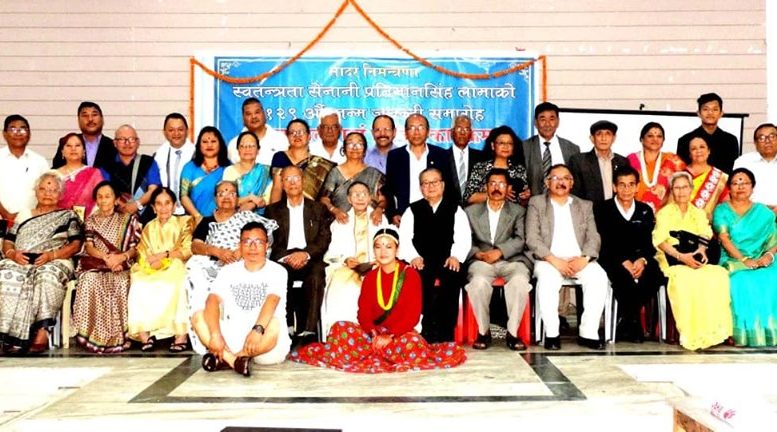

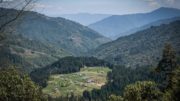
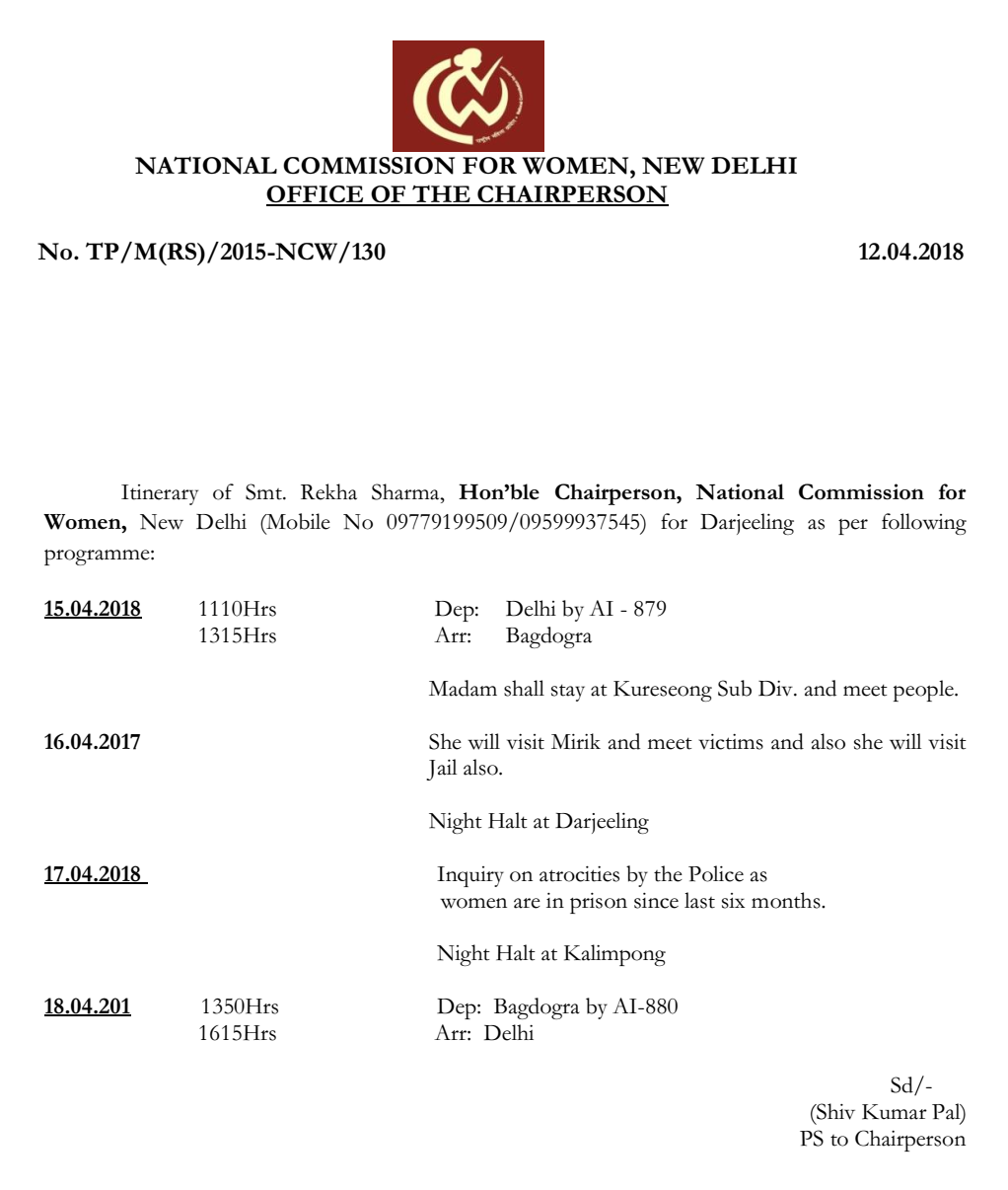
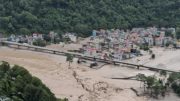
Leave a comment